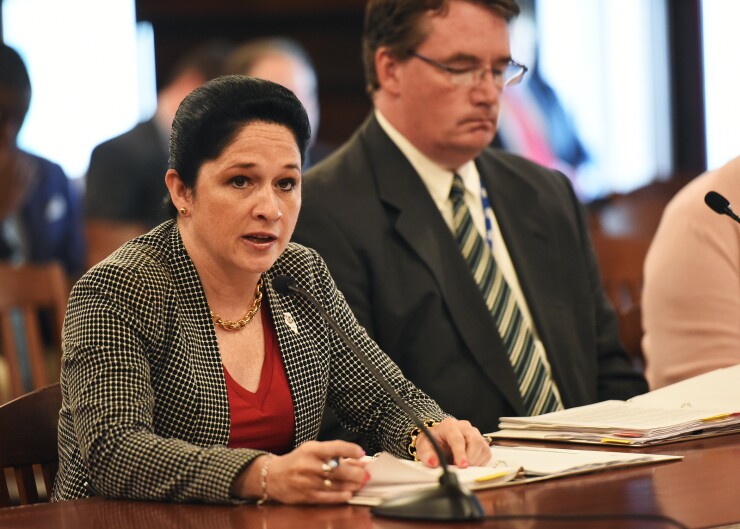A court decision is expected by mid-November in a legal dispute between Chicago and one of its four pension funds over whether the city is obligated to fully make up the shortfall between its statutorily required fund contribution and actual taxes collected to meet the requirement.
The difference between taxes levied and collected has typically come in about 2% to 2.5% short and referred to the “loss in collection.”

The decision in Retirement Board of the Firemen’s Annuity and Benefit Fund v. Chicago stands to impact state grant intercept requests filed with state Comptroller Susana Mendoza’s office by all four of the city’s pension funds.
The comptroller began in early 2018 enforcing pension code changes that allow the intercept of grant funds to Chicago and various state tax funds to all other Illinois municipalities to cover shortfall claims filed by local pension funds.
Both sides are seeking a quick resolution by asking Cook County Circuit Court Judge Sophia Hall to issue a summary judgment.
The
The fund has filed claims to intercept state grant funds totaling $1.78 million for a 2016 shortfall and $1.56 million for 2017 and $7.86 million for 2018.
“The court should grant summary judgment in favor of the plaintiffs and against the city because the undisputed material facts make plain that the city has failed to meet its obligations to the fund,” the fund argues in its filing. “It has failed to budget for or levy any amount of property taxes to account for the ‘loss in collection’ for the fund or any of the other city pension funds,” even though it does so as needed to cover debt service payments.
The
“If the city does these things, it has fully satisfied its funding obligations for the contribution year in question,” the city’s filings say.
The problem is the city’s combined payments have fallen short of meeting the amount laid out in statutes.
During oral arguments before Hall Wednesday on the summary judgment, the judge seemed perplexed at lawmakers’ lack of specificity and conflicts in the pension code leaving the court to answer the question of whether the city has met its obligations.
Recent changes to city pension laws also allow its funds to pursue legal action against the city to enforce payment requirements.
The city is also asking the court to issue credits toward future contributions of the grants withheld and distributed.
Hall said she expects to issue a decision on the dual summary judgment requests by Nov. 22 and possibly sooner.
It remains unclear whether the shortfall obligation is limited just to the five-year payment ramp for each of the funds that began in 2016 for police and fire and 2018 for the municipal and laborers’ funds under pension changes state lawmakers approved at the request of former Mayor Rahm Emanuel.
The changes are supposed to put the funds on a course to reach a 90% funded ratio by 2055 for two of the funds and 2057 for the other two. The city is carrying $30 billion of net pension liabilities and the system is less than 30% funded.
The payments ramp up to an actuarially based level to be determined for police and fire beginning in payment year 2021 and in 2023 for the other two funds. Chicago’s police and fire contribution will rise by about $280 million next year to meet the actuarial payment due in payment year 2021.
Lawyers for both sides in court Wednesday said the dispute could extend into those future years after the actuarial contributions hit. If that’s the case, the fiscal impact is significantly greater.
A
The city’s dispute is the latest legal action spurred by the updated pension code that allows pension funds to intercept state funds to cover shortfalls in actuarially based or statutorily contributions by filing claims with Mendoza’s office.
The distressed south Chicago suburb of Harvey first drew attention to the issue in April 2018 when it challenged the diversion sought by its public safety funds, who had legal judgments to support their shortage claims. It settled the case with its funds. So far pension funds from Harvey, North Chicago, and Chicago are the only ones to trigger intercepts for their public safety funds, with a handful of others triggered for Illinois Municipal Retirement Fund shortages.
Before the dispute began, Chicago warned in its 2018 annual financial analysis last summer that “should the recapture provisions of the pension code be invoked as a result of the city’s failure to contribute all or a portion of its required contribution, a reduction in state grant money may have a significant adverse impact on the city’s finances.”





